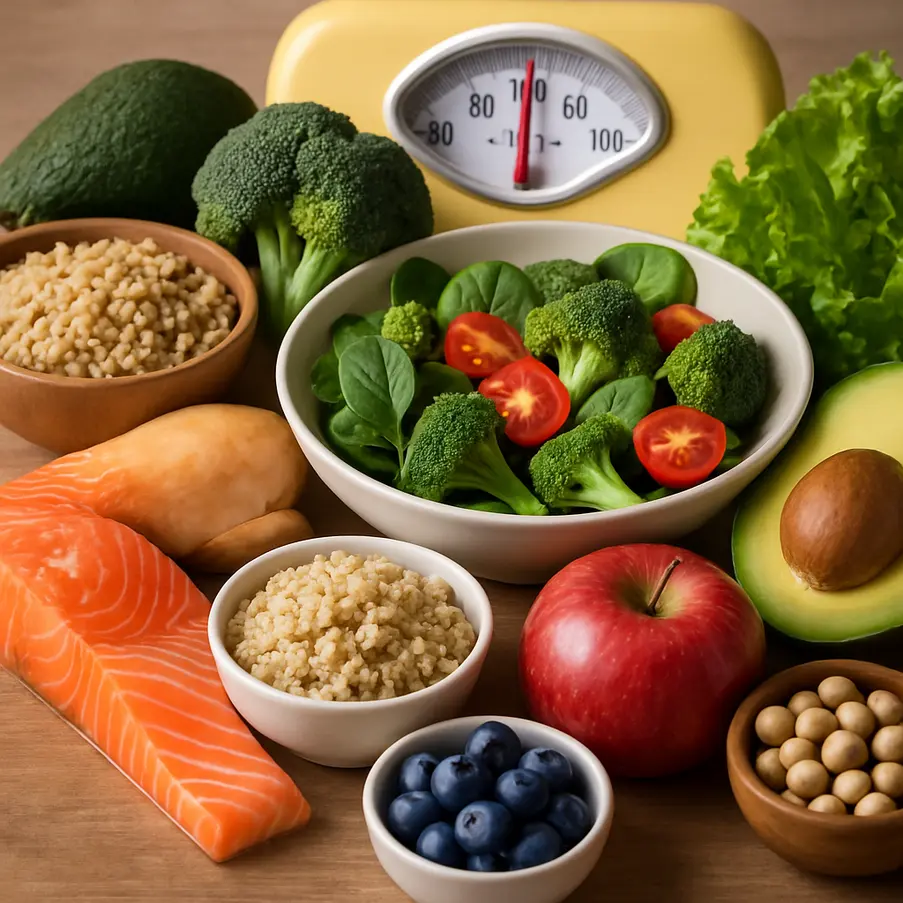Balanced nutrition is more than just a buzzword; it’s a powerful, sustainable approach to weight loss that empowers you to nourish your body while shedding those extra pounds. Understanding the components of a balanced diet and how they interact to manage weight can lead to lasting success without the frustration of restrictive diets. Dive into the symbiotic relationship between nutrients and weight management, and discover how to make informed choices that can transform your journey towards a healthier lifestyle.
Understanding the Core Elements of Balanced Nutrition
Balanced nutrition forms the cornerstone of effective weight loss by focusing on the essential components our body needs: macronutrients and micronutrients. Understanding the synergy between these nutrients can transform how you view food and fuel efficient weight loss.
Macronutrients—comprising carbohydrates, proteins, and fats—are vital as they provide the energy required for day-to-day activities. Carbohydrates, often misunderstood, are your primary energy source. Choosing complex carbohydrates, like whole grains and vegetables, ensures a steady energy release. Proteins, found in lean meats, legumes, and dairy, play a crucial role in muscle repair and growth, aiding in a higher metabolic rate. Healthy fats, including those from avocados and nuts, support hormone production and nutrient absorption.
Micronutrients, although needed in smaller amounts, are equally critical. Vitamins and minerals like Vitamin D, calcium, and iron facilitate essential body functions and bolster metabolism. Without these, your body’s ability to utilize macronutrients effectively is compromised, possibly hampering weight loss.
Maintaining this equilibrium not only promotes overall health but establishes a sustainable weight loss path. Ignoring this balance can lead to nutrient deficiencies, stalling your progress. I’ve witnessed how integrating a broad spectrum of nutrients changes one’s relationship with food, turning meals into opportunities to nourish rather than restrict.
Moreover, focus on meal variety to optimize nutrient intake across food groups. This ensures you aren’t just cutting calories but intelligently feeding your needs. For more details on nutrient synergy and its impact on weight management, consider reading our detailed guide on Balanced Nutrition: A Key to Successful Weight Loss. Mastering nutrition’s core principles allows anyone eager to lose weight to do so in a way that’s both effective and enduring.
The Role of Balanced Nutrition in Metabolism

Balanced nutrition is a game-changer when it comes to boosting metabolism and achieving weight loss. Understanding the connection between what we eat and our metabolic rate can unlock a more effective path to shed those extra pounds.
Our metabolism is a complex system responsible for converting the food we consume into energy. It significantly influences how efficiently our body burns calories. When meals are balanced, containing adequate proteins, fats, and carbohydrates, they provide a steady source of energy. Adequate protein intake, in particular, plays a vital role in metabolic function, as it requires more energy to digest, thus burning more calories—a phenomenon known as the thermic effect of food.
Contrary to the common approach of extremely low-calorie diets, balanced meals ensure your body doesn’t slip into ‘starvation mode’. This mode can decrease your metabolic rate as your body tries to conserve energy, making it harder to lose weight. Instead, choosing a diet that supports all your nutritional needs can stimulate an optimal metabolic environment.
Moreover, incorporating micronutrients like vitamins and minerals from a variety of food sources further assists in metabolic processes. These nutrients support thyroid function, hormone production, and enzyme activity, all vital to maintaining a healthy metabolic rate.
By embracing balanced nutrition, you create a sustainable way to enhance your metabolism. Trusting the process and focusing on nutritional quality over restrictive quantities can facilitate not only weight loss but also improved overall health. For further insight into crafting diets that optimize liver function for metabolism, you might consider exploring this guide on liver health supplements, which offers a deeper understanding of supporting optimal metabolic processes.
Crafting Your Personal Balanced Nutrition Plan
Crafting a personalized balanced nutrition plan is about finding what works for you. Your plan should align with both your health needs and lifestyle. Start by setting realistic weight loss goals. Aim for a gradual loss of one to two pounds a week; this is sustainable and more likely to result in long-term success.
When selecting foods, focus on including a variety of nutrient-dense options. Each meal should incorporate lean proteins, healthy fats, and plenty of fruits and vegetables. This combination not only boosts your health but also keeps you satisfied and less tempted to snack on unhealthy options.
Choose whole grains over refined ones, such as brown rice or quinoa instead of white rice. Whole grains are rich in fiber, aiding digestion and keeping you full longer. Opt for cooking methods like grilling, steaming, or baking to retain nutrients without adding unnecessary fats.
Tracking your nutritional intake can be a game-changer, providing insight into your eating habits and helping you make informed adjustments. Use apps or food diaries to log your meals and snacks. This practice can highlight patterns, identify areas for improvement, and contribute to mindful eating.
Consider visiting trusted resources like Balanced Nutrition: A Key to Successful Weight Loss for more in-depth guidance on compiling your nutrition plan. These tools can assist not just in weight management but also in overall health improvement. Stay flexible with your plan. Life changes and so should your diet. Regularly review your plan and make tweaks based on your progress, goals, and lifestyle adjustments.
Block "hepatoburn" not found
Overcoming Challenges with Balanced Nutrition for Weight Loss
Implementing balanced nutrition for weight loss may seem daunting due to common challenges like cravings and time constraints. Many of us struggle to resist these cravings, especially when stressed or tired. The key lies in setting realistic goals and finding healthier alternatives that still satisfy. Cravings often arise from a nutrient deficiency; ensuring a diet rich in proteins, healthy fats, and complex carbohydrates can help maintain satiety. For those irresistible sweet cravings, having fruits or a small piece of dark chocolate can offer a satisfying alternative.
Time is another significant barrier. With busy schedules, cooking healthy meals may feel impossible. However, preparing meals in advance can prove to be a game changer. Spending a few hours a week on meal prep ensures that nutritious options are available when time is limited. Batch cooking grains and proteins, and chopping vegetables in advance can enhance convenience without compromising nutritional value.
Staying motivated can also be cumbersome. Joining a community or finding a support group helps maintain accountability and encouragement. Sharing experiences with others may introduce new strategies and recipes to your routine. Practicing mindfulness is beneficial. Being present when eating can prevent overeating and improve digestion. Focusing on each bite and recognizing when you feel full develops a healthier relationship with food.
Balancing your diet doesn’t mean deprivation. Diversifying food choices and incorporating foods you enjoy in moderation is vital. Consider using apps or journaling to track your food intake. This can illuminate patterns and help make informed dietary choices. For more tips on creating daily wellness habits for weight loss, visit Daily Wellness Habits for Weight Loss. Each small adjustment brings you closer to long-lasting success on your weight loss journey. By implementing these strategies, you can overcome challenges and realize the benefits of balanced nutrition for effective weight loss.
Final words
Embracing balanced nutrition is key to unlocking your weight loss potential. The array of nutrients works in unison to support your body’s needs while promoting a healthier weight. By constructing well-thought-out meal plans tailored to your unique lifestyle, hurdles such as cravings and time management become manageable. Picture yourself thriving on meals that nourish you without deprivation. I invite you to continue exploring our resources and articles as you journey towards a healthier you, armed with the knowledge of balanced nutrition.
Block "hepatoburn" not found

